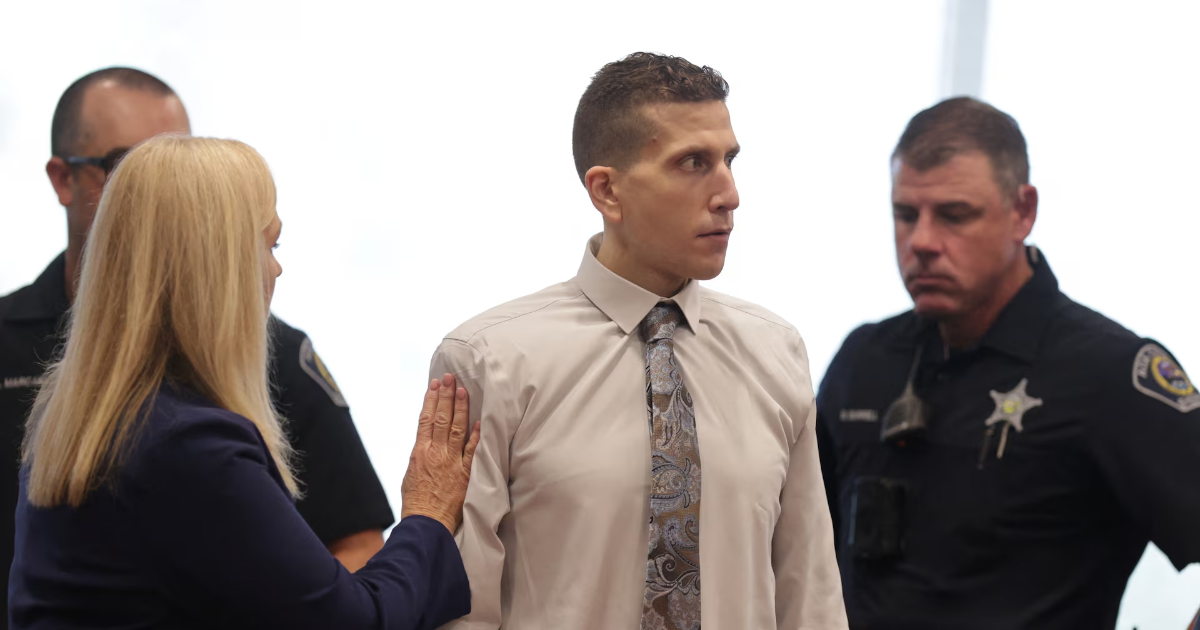BOISE, Idaho, July 23 (Reuters) – The former criminal-justice doctoral student convicted in the 2022 stabbing deaths of four University of Idaho students was sentenced to life in prison on Wednesday, but his motives for the killings remained a mystery.
Bryan Kohberger, 30, received four consecutive life terms without the possibility of parole or appeal under a deal with prosecutors sparing him the death penalty in return for pleading guilty earlier this month to four counts of first-degree murder.
Sign up here.
Judge Steven Hippler gave Kohberger, dressed in orange jail garb and seated beside his lawyers, an opportunity to make a statement before sentence was pronounced.
“I respectfully decline,” the defendant answered quietly, the only words he uttered during the 2-1/2 hour proceedings in Idaho’s Fourth District Court in Boise, the state capital.
Throughout the hearing he sat expressionless while relatives and friends of the victims – Ethan Chapin, 20, his girlfriend Xana Kernodle, 20, and her roommates Madison Mogen, 21, and Kaylee Goncalves, 21 – took turns venting their anger and anguish directly at him through the presentation of victim impact statements.
“I never imagined having to speak to someone so devoid of humanity,” Christy Goncalves, mother of Kaylee Goncalves.
The victim’s older sister Alivea addressed Kohberger in an unflinching accusatory tone, saying, “I will call you what you are – sociopath, psychopath, murderer.” She demanded, in vain, to know answers to such lingering questions as how he chose his victims and what were her sister’s last words.
In the end, she and other loved ones of the four slain students were left baffled over what had precipitated a crime that stunned the small college town of Moscow, Idaho, and riveted national media attention.
In pleading guilty on July 2, Kohberger admitted to the underlying allegations that he had crept into an off-campus house under cover of pre-dawn darkness on November 13, 2022, and stabbed the four students to death with a hunting knife, then slipped away. Two other women living at the house survived unharmed.
But the killer made no mention of motive. Authorities likewise have yet to offer an explanation for what might have driven Kohberger’s actions, and how or why he singled out his victims. Neither did the plea agreement require Kohberger to provide any such insights.
Bryan Kohberger, charged in the murders of four University of Idaho students, appears at the Ada County Courthouse, in Boise, Idaho, U.S., July 2, 2025. Kyle Green/Pool via REUTERS/File Photo Purchase Licensing Rights
President Donald Trump weighed in on the case on his Truth Social platform this week, saying he hoped the judge “makes Kohberger, at a minimum, explain why he did these horrible murders.”
Shortly before pronouncing sentence, Hippler lamented, “We are now certain who committed these unspeakable acts of evil, but what we don’t know and what we may never know is why.”
“I share the desire expressed by others to understand the why,” the judge said, adding that “by continuing to focus on why, we continue to give Mr. Kohberger relevance. We give him agency.”
“The need to know what is inherently not understandable makes us dependent on the defendant to provide us with a reason, and that gives him the spotlight, the attention and the power he appears to crave,” Hippler said.
Even if legally empowered to compel Kohberger to address the court, the judge asked, “How could anyone ever be assured that what he speaks is the truth?”
During the plea hearing earlier this month, Latah County Prosecuting Attorney Bill Thompson sought to rule out one possible avenue of speculation, declaring that there was no evidence of sexual assault among the victims or a “sexual component” to the killings.
At the time of the murders, Kohberger was pursuing a doctorate degree in criminal justice at Washington State University in Pullman, Washington, a short distance from the University of Idaho campus in the neighboring northwestern Idaho town of Moscow.
Thompson had said Kohberger planned the violence in advance, purchasing the knife online about eight months before the killings. The knife’s sheath was recovered, but the murder weapon was never found.
As evidence Kohberger sought to cover up his crimes, Thompson said investigators found he had meticulously cleaned the inside of his car, which he used as the getaway vehicle.
Authorities have said they linked Kohberger to the murders using DNA evidence, cellphone data and video footage. He was arrested weeks after the killings in Pennsylvania, where he was visiting family during the Christmas holidays, and was returned to Idaho to face charges.
Reporting by Matt McKnight in Boise, Idaho; Writing and additional reporting by Steve Gorman in Los Angeles; Editing by Raju Gopalakrishnan and Howard Goller
Our Standards: The Thomson Reuters Trust Principles.
Matt McKnight is an award-winning staff visual journalist who is based in Seattle, covering the Pacific Northwest and beyond. He has been a journalist covering stories in the American West since 2010, working previously at Cascade PBS and MSN News. McKnight is a longtime member of the National Press Photographer’s Association, and a former board director with the Western Washington chapter of the Society of Professional Journalists.
